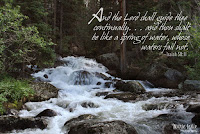The
Kingdom of God is many things, but most importantly, He is Lord and
King. Another important thing is that it is comprised of components
we call "churches" that gather in His name to worship,
pray, teach and learn, and share a memorial re-enactment of His Last
Supper. His churches are made up of people, all of whom are, like
everything He has made, individual. We share a faith in God, a
willingness to renounce and repent of sin, a committment to follow
Him, and a calling to love and share with the people that He puts in
our lives. When we let Him lead us, miracles happen. When we try to
do it all ourselves---no. The problem is that the calling on the
church is beyond ordinary human strength.
I grew up
at Grace Baptist Church, a good American Baptist church in Spokane,
Washington. Like Calvary Baptist Church, it was a large, strong
church back then. This is a historically important building, built in
about 1905, which seats 500 including balconies. When I visited about
2003, there
were about 65 people there and the pastor was getting ready to retire. There was a group renting part of the space that had started as a Bible study of people from a local Episcopalian cathedral, who studied themselves into a Baptist viewpoint. The last time I was there, this young group had merged with the older congregation, has a new name on the building and appears to be thriving. *
were about 65 people there and the pastor was getting ready to retire. There was a group renting part of the space that had started as a Bible study of people from a local Episcopalian cathedral, who studied themselves into a Baptist viewpoint. The last time I was there, this young group had merged with the older congregation, has a new name on the building and appears to be thriving. *
I came to
San Bernardino fresh out of college, just married to a man who
already attended Calvary Baptist. I also found that Calvary's then
associate pastor, Dr Owen Day, was an old friend of my dad's, and
been the senior pastor of Grace Church in Spokane before I was
born--he had introduced
my parents. So it was very easy for me to
become a part of the Calvary family. The current sanctuary was new,
and eventually leveled out at about 300 in attendance. By the mid
90's we had built it into the complex we see now, and were using most
of the space. We were just working on some major repairs and
renovations when the sanctuary was the victim of an arsonist in 1999.
It looked at first like we could recover; we had insurance and
started to rebuild. and just as they were getting into it, the
events of 9/11 left our insurance company holding an empty bag. We
didn't qualify for the California insurance guarantee program because
we had already gotten a few payments on the build. We did a
fundraiser of our own, which helped but not enough, and a building
loan from our Credit Union, on which we are still making payments. We
did finish the build in 40 months--rededicated the building in
February of 2003. But it wasn't good enough. The nursery school
became a financial liability that closed in 2009--just as the economy
tanked and people lost jobs, houses, and many of our good faithful
families had to leave the area for jobs. As a stopgap, we rented the
property to The Way World Outreach for five years, while we met at
the Elks Lodge, and then a few years ago we moved back.
This
church complex was built with dreams of ministry that we haven't
fulfilled. There are things we can't afford; things we don't know how
to do on the scale that this facility deserves. We have been offered
a partnership with a church family that can make a tremendous
difference. God kept us alive through all sorts of tough times; He
may have been waiting for the appropriate time to move, and shake San
Bernardino in amazing ways.
*Christ the Redeemer Church, Spokane, WA





